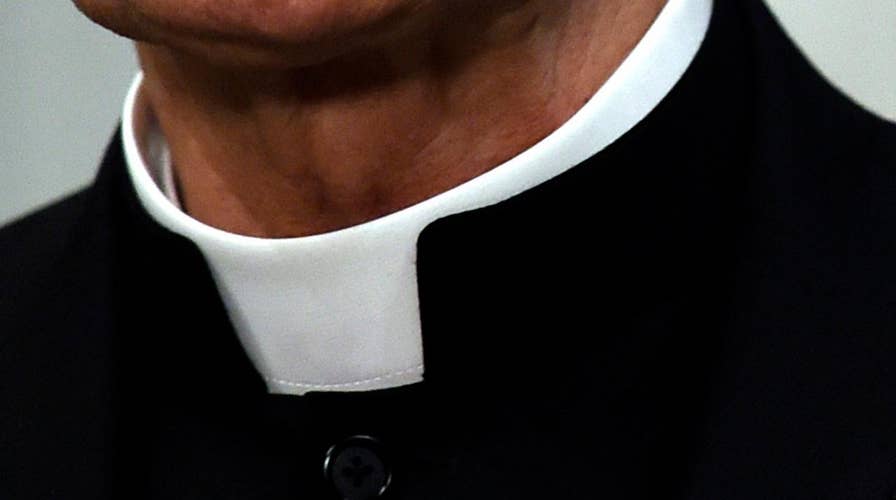Sweeping report on Catholic Church sex abuse in Pennsylvania
More than 300 Catholic priests in six Pennsylvania dioceses are accused of either sexually abusing children or helping others cover up abuse.
Priests, pastors and pain; three words that shouldn’t share the same sentence. Priests, pastors and hope? Yes. Priests, pastors and healing? By all means. But to learn of scandals perpetrated beneath the steeple; deception in the church rather than instruction? It takes its toll on the heartiest of souls.
A grand jury released a shocking report Tuesday that found over 300 Catholic priests in Pennsylvania sexually abused over 1,000 children over seven decades. And, as if that were not bad enough, the report found that church leaders covered up the sexual abuse – protecting the abusers instead of their victims.
News of the grand jury report, on top of earlier reports going back years about members of the clergy using their positions to become sexual predators, brings us face to face with one life’s hardest questions: what do I do with a violated trust?
Whether the perpetrator be a priest, a pastor, a rabbi or an evangelical leader, the struggle is a real one. When those who promised to nurture my soul bruised it, when those committed to taking care of me took advantage of me, how do I respond?
To be clear, I have no inside information on the case in Pennsylvania or elsewhere. I know nothing more about the allegations than any bystander might and far less than the investigators. It is not my job to assign guilt or innocence. But it is my desire to address the question many of us find ourselves facing at some point in life. When a leader lets me down, what do I do with the hurt?
Even deeper, at risk is our faith in God; if not His existence, at least His goodness. How could God allow this to happen? To be clear (and we must strive to be clear), God has strong words for pastors who purvey pain upon His people.
“You have not taken care of the weak. You have not tended the sick or bound up the injured. You have not gone looking for those who have wandered away and are lost. Instead, you have ruled them with harshness and cruelty. So my sheep have been scattered without a shepherd, and they are easy prey for any wild animal. …you abandoned my flock and left them to be attacked by every wild animal. And though you were my shepherds, you didn’t search for my sheep when they were lost. You took care of yourselves and left the sheep to starve….I now consider these shepherds my enemies, and I will hold them responsible for what has happened to my flock. I will take away their right to feed the flock, and I will stop them from feeding themselves. I will rescue my flock from their mouths; the sheep will no longer be their prey.” Ezekiel 34:2-10 (NLT)
The words could hardly be harsher. God sets a high standard for His leaders. “A bishop then must be blameless (I Tim. 3:2 NKJV). The Greek word translated “blameless” means, "not able to be held or taken hold of." It carries with it the idea of “insufficient evidence.” Blameless, then, means a life unmarred by a prevailing sin, be it a vice, or habit, or attitude, or an event. He or she is beyond accusation.
Does this mean the minister never slips or sins? No. It does mean he or she never dwells in a state of sin that could be a reflection on the church. Does this mean the individual’s past is perfect and without blemish? No, but it does mean that any dark chapter of the past has been dealt with in such a manner that he and those closest to the issue have put it to rest.
Such a life demands special effort. The Apostle Paul recognized this. He wrote: “We worked hard day and night so that we would not be a burden to any of you. …we wanted to give you an example to follow” (2 Thess. 3:8-9 NLT).
Let all pastors be warned: this is a holy responsibility and a high calling.
Yet, let all believers be reminded, for every clergy person who violates a trust, there are thousands who guard it jealously. For every religious leader who stumbles, there are thousands who serve faithfully, carefully, and lovingly. This is no time for blanket dismissals.
There is no perfect pastor or priest, except one. We, in the Christian faith, have found Jesus Christ to be exactly that. The perfect Priest. Scripture gives us this promise about Him:
“For our high priest (Jesus) is able to understand our weaknesses. He was tempted in every way that we are, but he did not sin. Let us, then, feel very sure that we can come before God’s throne where there is grace. There we can receive mercy and grace to help us when we need it” (Heb. 4:15–16 NCV).
We have a high priest who is able to understand. Since He understands, we find mercy and grace when we need it. We are not left to languish. We are not forgotten. We aren’t abandoned. Our God gets us.
Does this promise matter? If you ever wonder if God understands you, he does. If you ever wonder if God listens, he does. If you ever wonder if the Uncreated Creator can, in a million years, comprehend the challenges you face, then ponder long and hard the promise of the incarnation. Jesus is “able to understand our weaknesses” (Heb. 4:15 NCV). The One who hears your prayers understands your pain.
In a perfect world, every pastor would protect the sheep and every priest would nurture the flock. The vast majority of them do. Yet, in the instances that they don’t, our Good Shepherd is still present.









































